- Materiality: Supporting Value Creation through Governance
- Executive Nomination & Evaluation, and Next-Generation Leader Development
- Succession of Outside Directors and Outside Auditors
- Medium-term Business Strategy and Progress in Business Portfolio Transformation
- Approach to Improving Market Valuation and Enhancing Shareholder Value
Driving Business Portfolio Transformation and Preparing for the Future—Outside Directors' Insights into the Brother Group's Challenges and Prospects
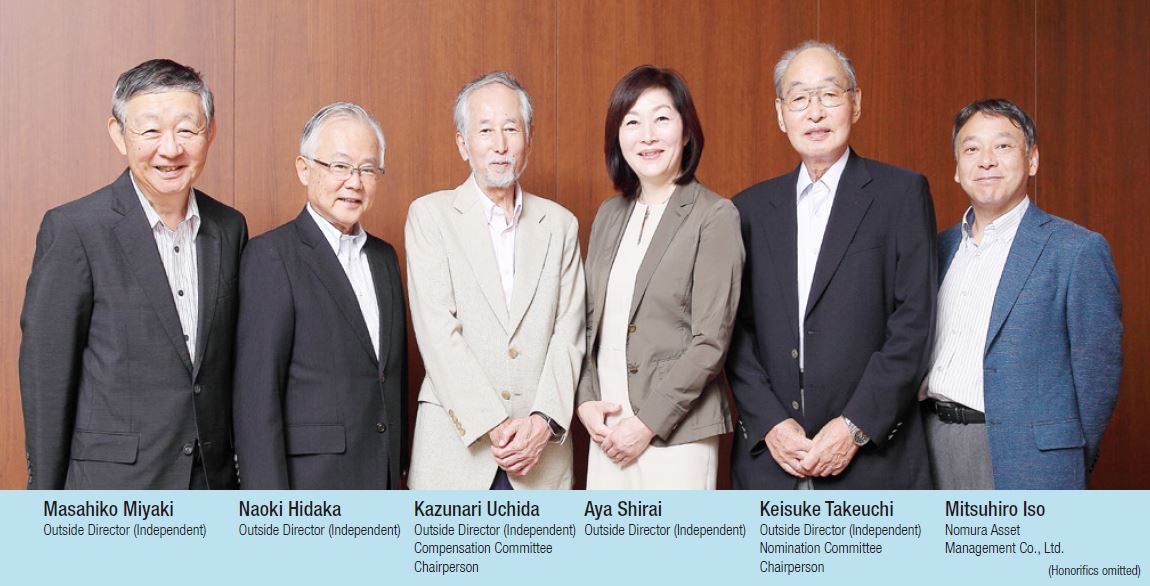
Under its vision "At your side 2030" and medium-term business strategy "CS B2027," the Brother Group is accelerating business portfolio transformation to strengthen profitability. To secure this progress and lay foundations for the future, strategic monitoring by the Board of Directors and the perspectives of Outside Directors are essential. In this Round Table, five Outside Directors discussed the Board's effectiveness, executive succession planning, investment in growth businesses, and measures to enhance shareholder value, sharing their views on the challenges and prospects for the sustainable growth of the Brother Group.
Materiality: Supporting Value Creation through Governance
Q: One materiality is "supporting value creation through governance," with efforts to enhance governance functions in anticipation of business portfolio transformation. As an Outside Director, how do you contribute to improving the quality of proposals for the executive and strategic discussions?
In "CS B2027," each business has clear roles and key metrics and is executing its own strategy accordingly. The Printing & Solutions (P&S) Business , as our core business and the main touchpoint with general consumers, is critical in directly communicating Brother's values. For example, by shifting packaging from polystyrene foam to pulp mold, CO2 emissions were cut by about 60%, a showing strong commitment to the environment. Such initiatives resonate with eco-conscious consumers, expand our fan base, and may attract future shareholders. Outside Directors should support these efforts.
For the growth business area, strategic investment, alliances, organizational agility, and diverse talents are essential. We must embrace varied values and global perspectives to foster a new culture that transcends traditional Japanese corporate frameworks. In particular, I see the need for deeper Board discussions on systems that enable talent diversity to flourish.
Even in a shrinking market, I believe the P&S Business can sustain revenue by expanding our share and strengthening cost competitiveness. In the Industrial area, Brother has technological prowess, but this is not yet fully reflected in revenue. By advancing application development, we can grow significantly in markets where Brother's strengths stand out.
For manufacturing, I see governance as "making good products properly, selling them properly, and guaranteeing them properly." Without acting "properly," risks such as quality issues or weaker price competitiveness may emerge. I believe that true governance at Brother lies in combining innovative ideas with solid technology to keep delivering products of real value to society.
Regarding governance, our Board of Directors is reviewing its role by debating the pros and cons of "management-oriented" versus "monitoring-oriented" models, including how best to oversee strategy execution. We are now identifying challenges we need to address and shaping concrete approaches to achieve "proactive governance." Going forward, I believe it is vital to further define the Board's role to firmly support sustained corporate value creation.
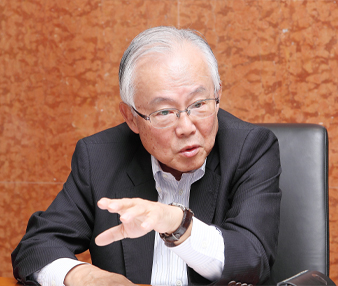
Executive Nomination & Evaluation, and Next-Generation Leader Development
Q: The selection of top executive and executive evaluation are critical governance functions directly tied to the medium- to long-term enhancement of corporate value. In the recent appointment of President Ikeda, what criteria and perspectives guided the Nomination Committee's discussions?
We began the selection process for the next president at the beginning of the year before last. All the Outside Directors interviewed each candidate to directly assess their views on management policies and company operations. We placed particular emphasis on leadership qualities—especially proactiveness and willingness to take on new challenges. Ultimately, Mr. Ikeda was recommended to the Board of Directors for his positive outlook, openness, and strong ability to lead the organization.
As noted, we evaluated candidates based on sufficient information. Although our Nomination Committee is a body advising the Board, I strongly felt the Board took its recommendations seriously and reflected them in its decision-making.
Succession planning is often prepared just 2–3 years in advance, but ideally it should begin the year after a new president takes office. That process should also include structured development, such as assigning candidates to key roles.
When we consider a structured development process, one challenge in our succession process is age distribution. President Ikeda and about half of the Executive Officers are in their 60s, so ensuring smooth successions is vital.
Promising young talent should be given executive positions early, such as subsidiary president roles, through strategic assignments. At present, succession planning is not yet fully embedded, so it is important for Outside Directors to actively engage and drive reform.
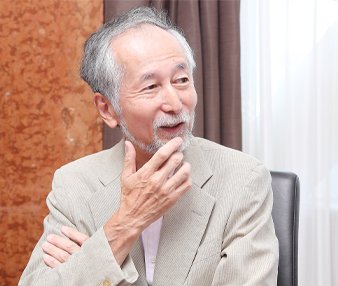
I agree. What concerns me most is the age gap among succession candidates. Executive succession candidates should be given diverse and challenging assignments early on to rigorously develop their capabilities as future presidential candidates.
Indeed, developing younger executive talent requires a structured development plan and a clear career path. For future executive talent, diverse experiences are essential, but in reality, managers often "hold on" to subordinates, limiting their opportunities to broaden their perspectives.
It is also crucial to foster management interest among Brother's technical talent. Even those with technical backgrounds should gain experience in HR, finance, and other corporate functions. Since about 80% of our workforce has a science or engineering background, keeping them confined to technical roles makes it difficult to develop future executives. Revisiting this structure to build a stronger pipeline of executive talent is a key challenge for the company.
Succession of Outside Directors and Outside Auditors
Q: How is the succession of outside officers currently being considered and developed? From the perspectives of diversity and required expertise, what challenges do you see in pooling, selecting, and appointing outside talent, and what improvements should be made going forward?
The Nomination Committee has had various discussions, but it is undeniable that the current candidate selection process remains rather passive. To sustain and strengthen the function of outside officers, both renewal and systematic selection are indispensable. The Board of Directors should be viewed as a single team; we need to assess the necessary skill sets and then revise the skill matrix in line with the future vision. We Outside Directors ourselves must also take a more proactive role in the appointment process.
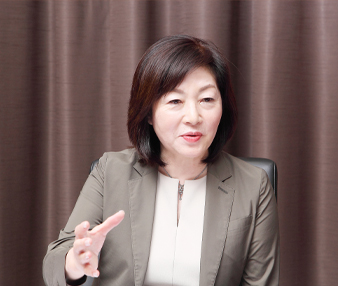
I agree. Of course, Outside Directors must fulfill their compliance oversight role, but more importantly, they are expected to serve as an "accelerator" for driving transformation.
As for diversity, the focus should not be limited to attributes such as gender or nationality, but should also extend to diversity of perspectives and ways of thinking. It is important to envision what Brother should look like in the future and work backward from there to define the required talent profile. If the mindset is simply "who should succeed the current officer," appointments will inevitably remain an extension of the past. For example, appointing young venture entrepreneurs or seriously globalizing the Board by inviting non-Japanese members and conducting Board meetings in English—such bold measures should be considered.
Regarding the appointment of outside officers, I intend to become more actively involved and make stronger proposals. In this year's Nomination Committee, based on our view of the Board's ideal form, we plan to deepen discussions on what nomination and appointment process for outside officers would be most effective, as well as how each committee member's role should be defined.
Medium-term Business Strategy and Progress in Business Portfolio Transformation
Q: Under the medium-term business strategy "CS B2027," Brother continues to pursue expansion in the industrial area and transformation in Printing, following the previous medium-term business strategy "CS B2024" (FY2022–FY2024). How does the Board of Directors monitor business portfolio transformation and ensure its effectiveness?
The direction of significantly increasing the industrial area's percentage of sales is clear, but at this stage the activities still seem insufficient. As long as the P&S Business remains steady and profitable, there is a tendency for the sense of urgency about transformation to fade. What truly matters is not the quality of the strategy itself but the ability to execute it.
Since organic growth alone has its limits, it is essential to bring in talent from outside to head businesses and take on a pivotal role in driving growth and transformation. Active use of M&A will also be indispensable. The personnel system must be reviewed as well. Unless we shift toward valuing those who take on challenges—even if they fail—over those who simply do nothing, strategies risk ending up as nothing more than aspirations on paper.
In monitoring business portfolio transformation, what I pay close attention to is whether the Company has become bolder in its allocation of resources. Instead of relying too heavily on M&A, I believe the Company should also significantly expand investment in areas such as R&D to drive growth. I am also carefully monitoring how effectively management is reallocating talent to growth areas.
At the same time, the P&S Business must continue to generate stable profits. It is therefore extremely important for the executive to send clear messages and engage in thoughtful internal communication so that people in this business feel they are truly valued by the Company. This sense of psychological support and teamwork is, in my view, the very foundation that enables the Company to push forward transformation across the organization.
Approach to Improving Market Valuation and Enhancing Shareholder Value
Q: The Company's PBR and PER are below the averages of the TSE Prime Market.
How does the Board of Directors view and discuss these market valuations?
I see two main reasons why our stock price has been sluggish. First, our organization places a strong emphasis on stability and careful, steady execution. While this has its merits, it has also led to the accumulation of shareholders' equity, resulting in lower capital efficiency. Second, the market does not yet have sufficient confidence in our future growth potential. We need to communicate more clearly and convincingly about our strategic shift toward the industrial area and convey the specific initiatives and expectations behind it.
We already have an excellent lineup of machine tools, and the key will be how we grow these businesses. Organic growth alone has its limits, so we must also consider M&A as an important option to complement our marketing, technological, and solution capabilities.
Generating profits is, of course, the basic mission of any company. At the same time, however, it is equally important that the market sees us as a company that inspires dreams and expectations. To achieve this, we must strengthen our dialogue with the capital markets and proactively communicate our growth strategy and future vision through IR activities.
When it comes to new businesses, projects of only several billion yen in scale would be unlikely to gain meaningful recognition from the market. We should be envisioning businesses of at least tens of billions of yen, and ultimately even larger. Exploration in this area should include a robust intellectual property strategy. I especially hope that the creativity and execution capabilities of our technical talent will be harnessed to drive the creation of new businesses.
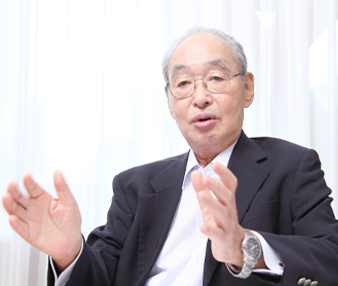
To continuously enhance our market valuation, repurchasing of our own shares may be one option, but what is even more important is transforming our business structure toward higher profitability.
In addition, strengthening sustainable management and enhancing brand value will form the foundation for enhancing shareholder value. Expanding the base of Brother brand fans and attracting more long-term investors who are willing to hold our shares in support is also essential. To that end, we should consider every possible option, including bold measures such as changing the company name.
To meet investor expectations for growth, it will be essential to strengthen our competitiveness, not only in selling products (mono-uri) but also in offering solutions and services (koto-uri). For example, in the P&S Business, we must further accelerate the shift from a conventional one-time sales model to "customer-engagement" business models such as MPS*1 and subscription services.*2
However, the market currently perceives our execution in koto-uri as insufficient, which makes our valuation overly dependent on short-term business performance and leaves our PER at a low level. Demonstrating Brother's unique business model with a ten-year perspective to the capital markets is critical.
I also believe that sustainable growth in manufacturing comes from combining both mono-uri and koto-uri. The ideal is to become a company that earns the trust of society and the love of customers, with profits and share prices naturally following as a result. While it is inevitable that our performance will fluctuate due to external factors such as exchange rates or tariff policies, we should not be swayed by these in the short term. Instead, I believe that steadily pursuing Our Purpose as articulated in the Brother Group Vision "At your side 2030" will build the foundation for long-term shareholder value creation.
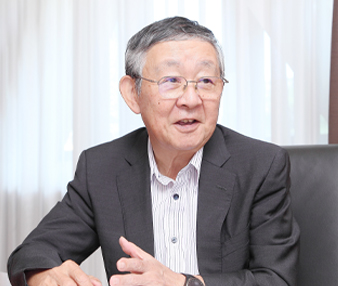
- Managed Print Services: Print services for corporate customers that can optimize functions and pricing plans for each customer
- A fixed fee monthly subscription service

